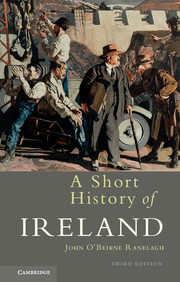Book contents
- Frontmatter
- Contents
- List of figures
- Preface to the first edition
- Preface to the second edition
- Preface to the updated edition
- Preface to the third edition
- Map of Ireland: The Pale and the Irish plantations
- Chapter 1 Beginnings
- Chapter 2 Ascendancy
- Chapter 3 Union
- Chapter 4 Home rule?
- Chapter 5 Rising
- Chapter 6 South
- Chapter 7 North
- Chapter 8 Another country
- Appendix Timeline of Irish history
- Select bibliography
- Index
- References
Chapter 8 - Another country
Published online by Cambridge University Press: 05 November 2012
- Frontmatter
- Contents
- List of figures
- Preface to the first edition
- Preface to the second edition
- Preface to the updated edition
- Preface to the third edition
- Map of Ireland: The Pale and the Irish plantations
- Chapter 1 Beginnings
- Chapter 2 Ascendancy
- Chapter 3 Union
- Chapter 4 Home rule?
- Chapter 5 Rising
- Chapter 6 South
- Chapter 7 North
- Chapter 8 Another country
- Appendix Timeline of Irish history
- Select bibliography
- Index
- References
Summary
The Republic’s referendums and constitutional change of the 1990s took place during heady economic performance, enviable to the rest of the world, and extraordinary in its speed. The Economist surveyed the Republic in 1988:
Take a tiny, open, ex-peasant economy. Place it next door to a much larger one . . . Infuse it with a passionate desire to enjoy the same lifestyle . . . Inevitable result: extravagance, frustration, debt. Ireland today is bravely facing up to the consequences of a decade of borrowing to pay for better public services than its wealth justified. Its citizens, many of whom have already endured six years of stagnant real incomes, are just beginning to come to terms with the extent to which the country has to change . . . Its gross domestic product is a mere 64% of the European Community average.
Nine years later the Economist wrote:
Just yesterday, it seems, Ireland was one of Europe’s poorest countries. Today it is as prosperous as the European average, and getting richer all the time.
In 2008 Ireland once more had to face up to the consequence of borrowing. By then, the country’s wealth-creating ability had increased beyond anything imagined in 1988. Ireland had become another country.
By 2000, the Republic was the principal base for American companies in Europe. Its very favourable corporate tax regime (12.5 per cent) hosted twelve of the US’s top twenty electronic companies and the top ten pharmaceutical companies. All the Viagra tablets in the world came from Pfizer in co. Cork. Between 1988 and 2000, GNP growth had been compounding at an average of over 5 per cent every year. The country, with less than 1 per cent of Europe’s population, attracted about 25 per cent of all US investment in Europe. Employment grew by over 400,000; national debt halved. Unemployment decreased to an historic low of 3.6 per cent in 2001. The country had become what Kevin Gardiner, an analyst at Morgan Stanley, in 1994 termed a ‘Celtic tiger’, making a comparison with the rapid growth of the Asian ‘tigers’ a decade earlier.
- Type
- Chapter
- Information
- A Short History of Ireland , pp. 368 - 391Publisher: Cambridge University PressPrint publication year: 2012



